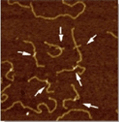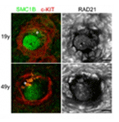Division of Molecular Genetics
Link
・Division of Molecular Genetics HP : http://www.fujita-hu.ac.jp/~genome/mg/
About our Research
(1) Mechanisms of gross chromosomal rearrangements

It has been long accepted that most of the gross chromosomal rearrangements (GCRs) are random events. Recently a growing body of evidence indicates that “non-B form DNA” and "three dimensional organization of the chromosome in the nucleus" affect the development of GCRs, suggesting the non-random nature of the GCRs. We are studying the mechanism of GCRs using our unique model system with the aid of advanced technologies, such as next generation sequencing, Hi-C, and genome editing.
(2) Mechanism of chromosomal aneuploidy

It is well-known that frequency of chromosomal aneuploidy in oocytes increase with maternal age, but the mechanism is still unknown. Another unsolved question is why male carrier for balanced chromosomal rearrangement manifest infertility, but female carrier manifests recurrent pregnancy loss. It is possible that dimorphism of the mechanism in segregation of meiotic chromosomes affects the differences in reproductive outcome. We are studying these mechanisms using human samples and mouse model systems.
(3) Laboratory for Genetic Diagnosis

We are supporting medical doctors who request genetic testing for suspected cases of Mendelian diseases or chromosomal disorders. For identifying chromosomal alterations or mutations at nucleotide level, we use advanced techniques, such as microarray and next generation sequencing. Further, we are now setting up recently-developed techniques, non-invasive prenatal diagnosis and comprehensive preimplantation genetic diagnosis.
(4) Department of Genetic Counseling
Since the news reports that Angelina Jolie had a pre-symptomatic genetic test for hereditary breast cancer and that a number of aged pregnant women had a blood test for non-invasive prenatal trisomy test, "genetics" draw increasing attention of general people. However, people are too poorly informed to understand such topics along with ethical, legal and social problem. In the Department of Genetic Counseling in Fujita Health University hospital address these issues and provides information and psychological support to people who have or may be at risk for genetic disorders.
Selected Publications
1. Inagaki H, Ohye T, Kogo H, Tsutsumi M, Kato T, Tong M, Emanuel BS, Kurahashi H. Two sequential cleavage reactions on cruciform DNA structures cause palindrome-mediated chromosomal translocations. Nat Commun. 2013; 4: 1592.
2. Tsutsumi M, Kowa-Sugiyama H, Bolor H, Kogo H, Inagaki H, Ohye T, Yamada K, Taniguchi-Ikeda M, Toda T, Kurahashi H. Screening of genes involved in chromosome segregation during meiosis I: in vitro gene transfer to mouse fetal oocytes. J Hum Genet. 2012; 57: 515-22.
3. Miyamura H, Nishizawa H, Ota S, Suzuki M, Inagaki A, Egusa H, Nishiyama S, Kato T, Pryor-Koishi K, Nakanishi I, Fujita T, Imayoshi Y, Markoff A, Yanagihara I, Udagawa Y, Kurahashi H. Polymorphisms in the annexin A5 gene promoter in Japanese women with recurrent pregnancy loss. Mol Hum Reprod. 2011; 17: 447-52.
4. Ohye T, Inagaki H, Kogo H, Tsutsumi M, Kato T, Tong M, Macville MV, Medne L, Zackai EH, Emanuel BS, Kurahashi H. Paternal origin of the de novo constitutional t(11;22)(q23;q11). Eur J Hum Genet. 2010; 18: 783-7.
5. Bolor H, Mori T, Nishiyama S, Ito Y, Hosoba E, Inagaki H, Kogo H, Ohye T, Tsutsumi M, Kato T, Tong M, Nishizawa H, Pryor-Koishi K, Kitaoka E, Sawada T, Nishiyama Y, Udagawa Y, Kurahashi H. Mutations of the SYCP3 gene in women with recurrent pregnancy loss. Am J Hum Genet. 2009; 84: 14-20.
2. Tsutsumi M, Kowa-Sugiyama H, Bolor H, Kogo H, Inagaki H, Ohye T, Yamada K, Taniguchi-Ikeda M, Toda T, Kurahashi H. Screening of genes involved in chromosome segregation during meiosis I: in vitro gene transfer to mouse fetal oocytes. J Hum Genet. 2012; 57: 515-22.
3. Miyamura H, Nishizawa H, Ota S, Suzuki M, Inagaki A, Egusa H, Nishiyama S, Kato T, Pryor-Koishi K, Nakanishi I, Fujita T, Imayoshi Y, Markoff A, Yanagihara I, Udagawa Y, Kurahashi H. Polymorphisms in the annexin A5 gene promoter in Japanese women with recurrent pregnancy loss. Mol Hum Reprod. 2011; 17: 447-52.
4. Ohye T, Inagaki H, Kogo H, Tsutsumi M, Kato T, Tong M, Macville MV, Medne L, Zackai EH, Emanuel BS, Kurahashi H. Paternal origin of the de novo constitutional t(11;22)(q23;q11). Eur J Hum Genet. 2010; 18: 783-7.
5. Bolor H, Mori T, Nishiyama S, Ito Y, Hosoba E, Inagaki H, Kogo H, Ohye T, Tsutsumi M, Kato T, Tong M, Nishizawa H, Pryor-Koishi K, Kitaoka E, Sawada T, Nishiyama Y, Udagawa Y, Kurahashi H. Mutations of the SYCP3 gene in women with recurrent pregnancy loss. Am J Hum Genet. 2009; 84: 14-20.
